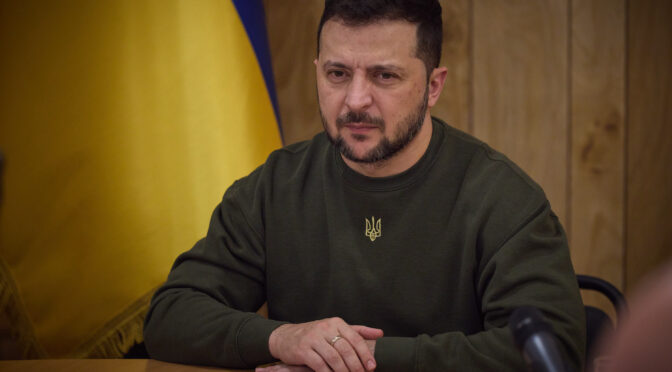Article published in The Daily Telegraph, 28 December 2023. © Richard Kemp
As we look back at 2023, despite all of the problems we have faced, such as economic trauma and a spiralling immigration crisis, Britain can take at least some satisfaction in our role in the two most significant conflicts this decade and perhaps of this century so far: Ukraine and Gaza. But much greater challenges lie ahead.
In Ukraine, Putin’s leading propagandist just gave a back-handed compliment to the UK, blaming us for the latest blow to Russia’s Black Sea fleet with the claim that it was a British-supplied Storm Shadow missile that struck the Novocherkassk landing ship in the Crimean port of Feodosia on Boxing Day. Devastating though that attack was, however, the prospects for Ukraine in this war remain bleak.
Kyiv’s long-fought counteroffensive has failed. At tremendous cost and despite heroic fighting, it has taken little ground and there is no immediate prospect of further advances. The opposite, in fact. While defending against Ukrainian efforts to break through their lines, Moscow has also been on the offensive and on Christmas Day its forces appear to have captured the town of Marinka in eastern Donbas. This would be the greatest battlefield success on either side since Russia captured Bakhmut in May. It provides a pivot point to allow Moscow’s forces to attack Ukrainian defences further south.
But it has even greater strategic significance; it is yet another body blow to Ukraine’s international support, which has been flagging for months, with worse to come. The US has hit a political wall, with the delicate bipartisan support breaking down. It will be difficult for presidential candidates, in an election year, to justify spending more billions on Ukraine while Americans suffer from the legacy of a year of high inflation.
The EU has also hit a wall. Yes, it can work around Hungary’s Viktor Orban by funding trusts with all member states bar one. But across Europe, nationalist parties that need to gain electoral traction by focusing on their own people are now on the rise as the liberal international order is increasingly brought into question. As with the US, unlimited European funds for Ukraine may soon prove an impossibility.
It is only in Britain that we still see clear bipartisan support, with Labour and the Tories mostly reading from the same sheet. Britain has led the way in supplying critical anti-tank missiles, a range of other munitions and vital intelligence and surveillance assets.
But with our armed forces and armaments industries degraded to historically low levels by successive governments, we now have little more to give. Nonetheless, one of our greatest contributions to date has been prompting increased support by other countries, including the US, through diplomatic pressure as well as taking a lead in supplying long range missiles and tanks. That effort, at least, must be maintained in 2024.
Beyond war-weariness and the influence of the electoral calendar, the outlook for Ukraine has also been badly affected by the war in the Middle East. That has diverted political attention, and potentially the supply of munitions and other resources.
The two conflicts are linked in other ways too. Iran, whose funds are behind the war in Gaza as well as aggression by its proxies in Lebanon and Yemen, is a key weapons supplier to Moscow, which itself has taken a hard line on events in the Middle East. Recognising the immense benefits for him of this conflict, Putin has helped fuel anti-Israel sentiment.
Along with the US, Britain has provided a bulwark against those who wish to undermine Israel’s legitimate self-defence. As with the Ukraine war, we are one of the few countries to maintain a solidly bipartisan stand in our support for Israel, despite the strongest efforts to derail it from the hard-Left.
Together, these wars represent the two greatest geopolitical challenges we face today and indeed for the foreseeable future: authoritarian dictatorships and violent Islamism, as well as the nexus between the two.
Next year will be defining in Europe and the Middle East. It seems likely to include further Russian victories in Ukraine as well as escalation of the current conflict between Israel and Lebanese Hizballah.
If Russia defeats Ukraine, it will be due to half-hearted support from the US and Europe – upon which Kyiv is wholly dependent – largely because of an unfounded fear of Putin. Israel is also dependent on US support, which in turn is influenced to some extent by America’s allies in Europe. Their backing for Israel is already wavering in the face of a concerted propaganda campaign, as well as fear of Iran.
Our priority should not be on pusillanimously trying to avoid escalation, but on doing everything we possibly can to ensure our allies win.
Image: President of Ukraine

